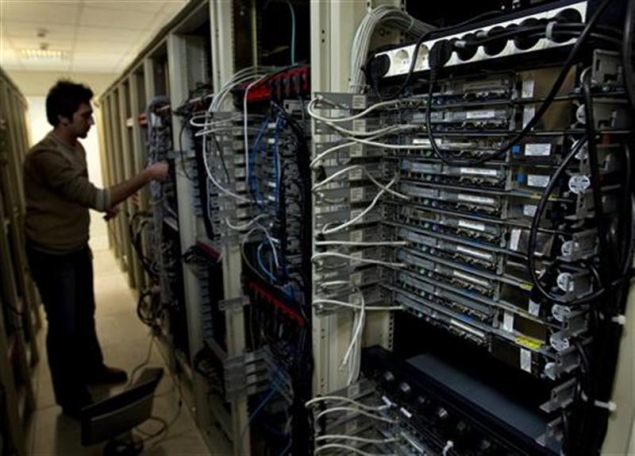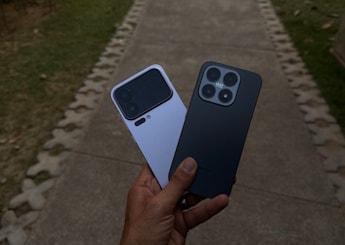- Home
- Internet
- Internet News
- Brazil promises fast Internet connections at World Cup
Brazil promises fast Internet connections at World Cup

Each of the 12 stadiums hosting the 32-nation soccer tournament will have two separate 50-gigabyte networks connected to Brazil's fiber optic backbone, he told reporters.
"I doubt that the stadiums will use one third of the capacity that we are installing," Bernardo said.
"Not even Mr Jerome Valcke will use up all that capacity, though he could if he makes a lot of explosive statements," the minister said in reference to the general secretary of FIFA, the governing body of global soccer.
Valcke was briefly declared persona non grata by the Brazilian government last year for saying Brazil needed a "kick up the backside" to speed up preparations for the World Cup.
Though relations between Brazil and Valcke have improved since, FIFA remains concerned about construction delays for the stadiums that will host the games. It has also expressed worries about the readiness of hotel, transport and communications facilities.
Brazil has yet to officially open two of the six stadiums that will be used for the Confederations Cup, a dress rehearsal for the 2014 tournament. The smaller contest kicks off on June 15 with Japan facing the host country in the capital, Brasilia.
More than half a million soccer fans are expected to travel to Brazil next year for the World Cup. Many will be emailing and posting photos on social networks during the games, congesting local wireless networks.
Brazil officially launched the latest fourth generation (4G) wireless technology this week, and the service will be available at the stadiums and in the host cities for the Confederations Cup.
But the majority of foreign fans will not be able to use it. That is because most smartphones in the United States and Europe use the 700 MHz frequency, while Brazil's 4G network uses 2.5 GHz.
"Whoever has a 700 MHz cellphone will not be able to use 4G, they will have to use 3G," Bernardo said.
The minister recommended that fans leave their cellphones at home to avoid paying "scorching" international roaming fees, and instead get a local chip on arrival in Brazil.
Brazil's wireless infrastructure is among FIFA's top concerns ahead of the World Cup. FIFA spokesman Walter de Gregorio said last month Brazil should maybe fix its 3G network before jumping to 4G.
The number of 3G users in Brazil has grown "explosively" to 70 million since the technology was introduced in 2008, and is expected to grow to 130 million by the end of 2014, Bernardo said.
Brazilians complain the service provided by local cellphone companies is poor, with connections dropping regularly and signals congesting at crowded events such as music festivals.
Paying for access to Wi-Fi may be the best means of communications at the World Cup for those wanting to capture the excitement of the games and post it on social networks.
Ample high-speed Wi-Fi access will be good news for the heaviest users of broadband at any major sporting event: the media, who rely on the Internet to send out pictures and video images.
© Thomson Reuters 2013
Catch the latest from the Consumer Electronics Show on Gadgets 360, at our CES 2026 hub.
Related Stories
- Samsung Galaxy Unpacked 2025
- ChatGPT
- Redmi Note 14 Pro+
- iPhone 16
- Apple Vision Pro
- Oneplus 12
- OnePlus Nord CE 3 Lite 5G
- iPhone 13
- Xiaomi 14 Pro
- Oppo Find N3
- Tecno Spark Go (2023)
- Realme V30
- Best Phones Under 25000
- Samsung Galaxy S24 Series
- Cryptocurrency
- iQoo 12
- Samsung Galaxy S24 Ultra
- Giottus
- Samsung Galaxy Z Flip 5
- Apple 'Scary Fast'
- Housefull 5
- GoPro Hero 12 Black Review
- Invincible Season 2
- JioGlass
- HD Ready TV
- Laptop Under 50000
- Smartwatch Under 10000
- Latest Mobile Phones
- Compare Phones
- Honor Magic 8 RSR Porsche Design
- Honor Magic 8 Pro Air
- Infinix Note Edge
- Lava Blaze Duo 3
- Tecno Spark Go 3
- iQOO Z11 Turbo
- OPPO A6c
- Samsung Galaxy A07 5G
- Lenovo Yoga Slim 7x (2025)
- Lenovo Yoga Slim 7a
- Lenovo Idea Tab Plus
- Realme Pad 3
- Moto Watch
- Garmin Quatix 8 Pro
- Haier H5E Series
- Acerpure Nitro Z Series 100-inch QLED TV
- Asus ROG Ally
- Nintendo Switch Lite
- Haier 1.6 Ton 5 Star Inverter Split AC (HSU19G-MZAID5BN-INV)
- Haier 1.6 Ton 5 Star Inverter Split AC (HSU19G-MZAIM5BN-INV)







![[Sponsored] Haier C90 OLED TV | Dolby Vision IQ, 144Hz OLED and Google TV in Action](https://www.gadgets360.com/static/mobile/images/spacer.png)









